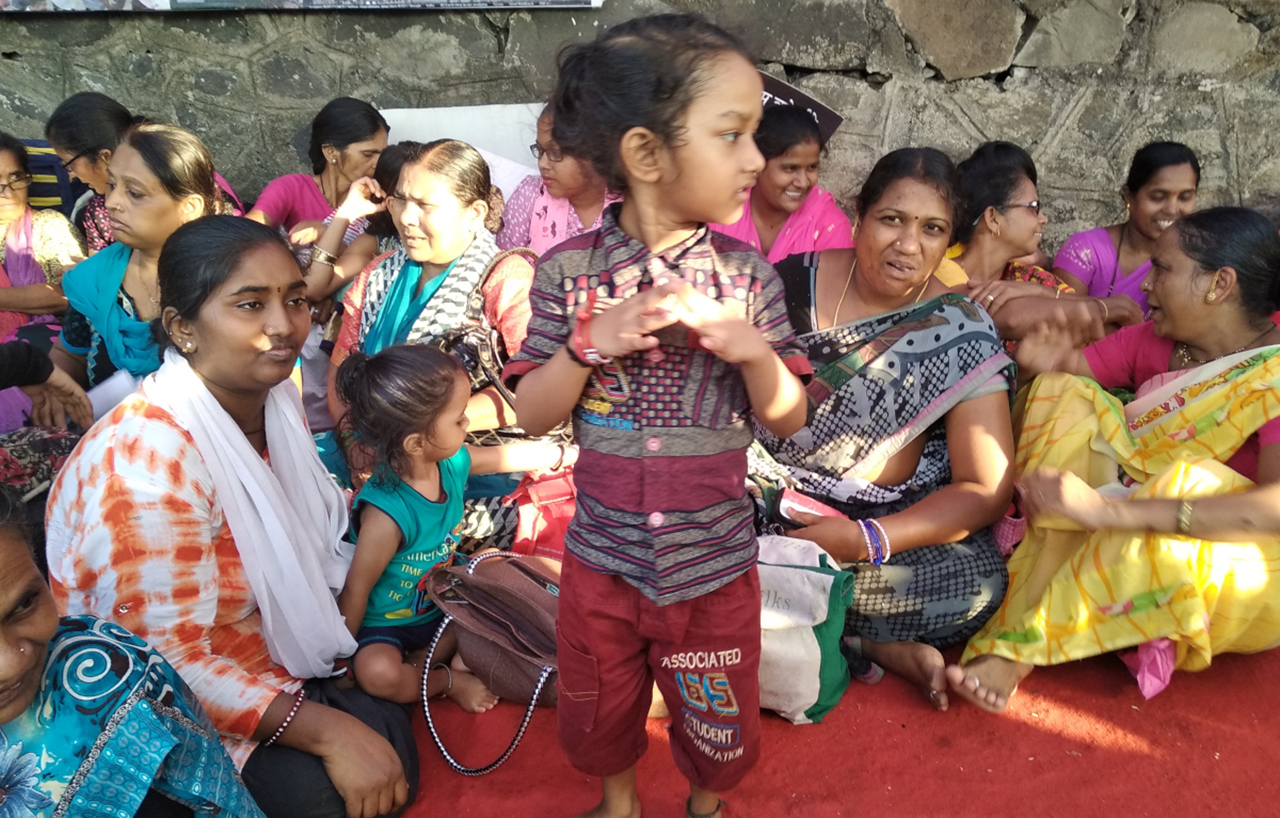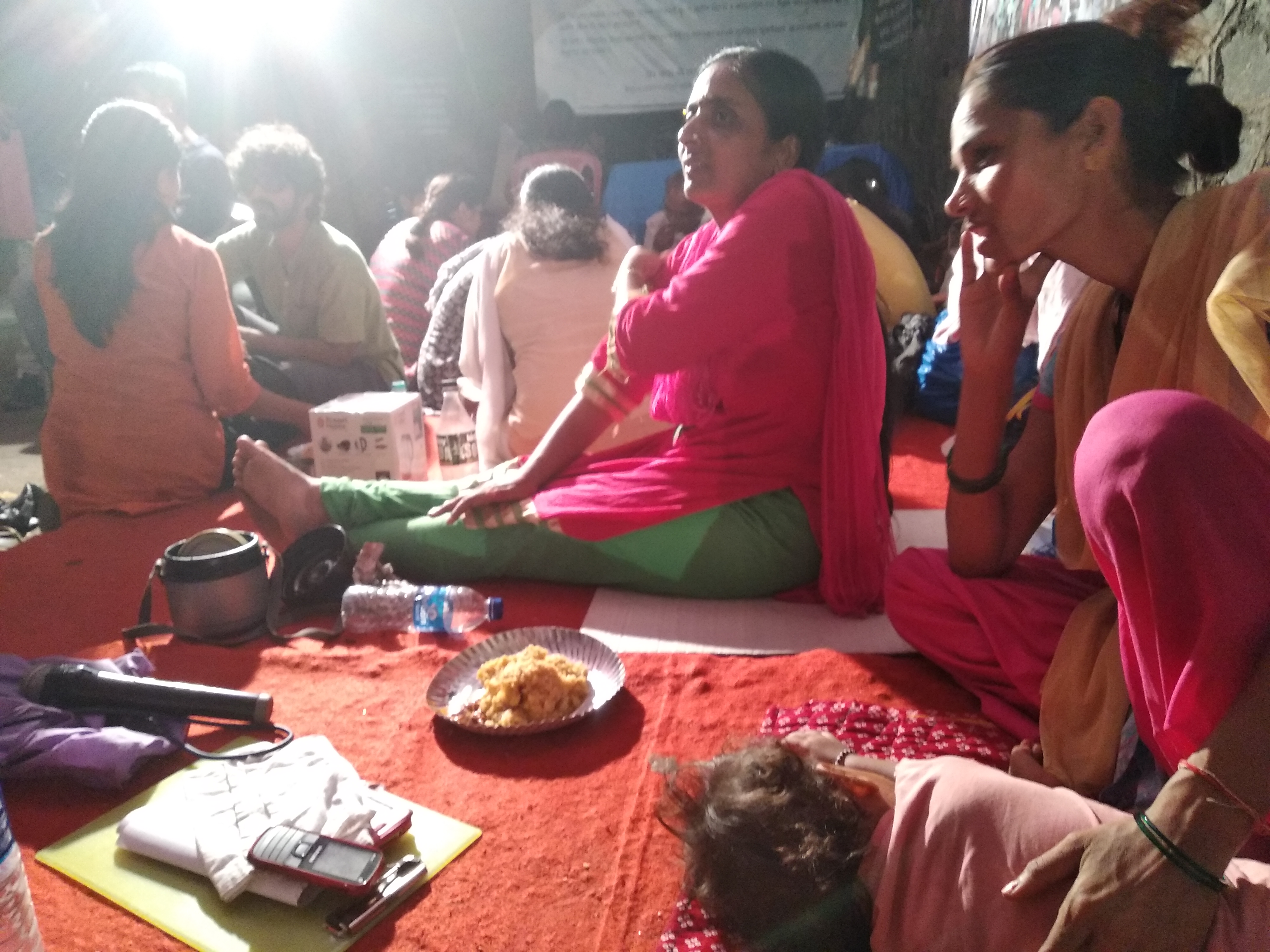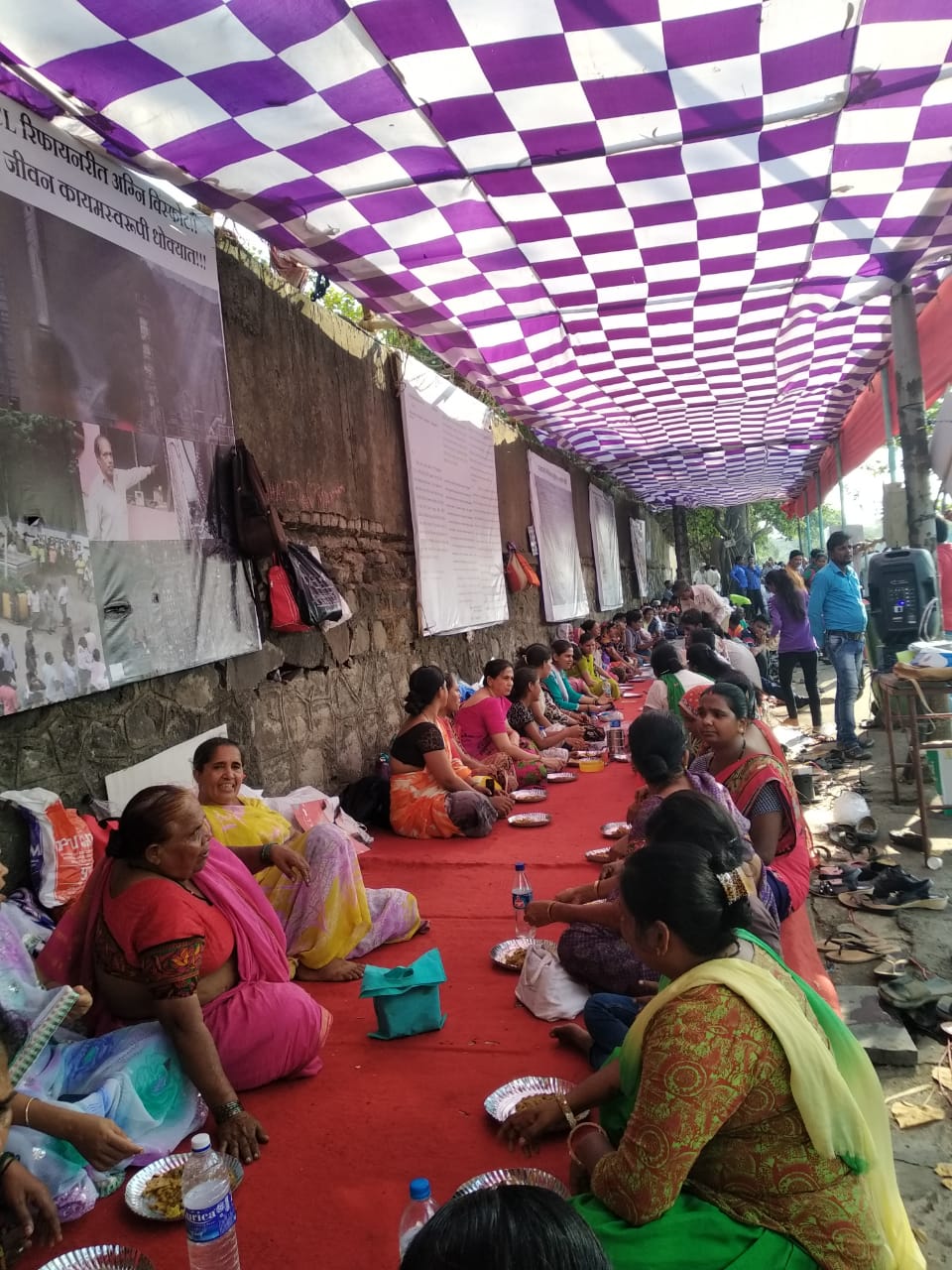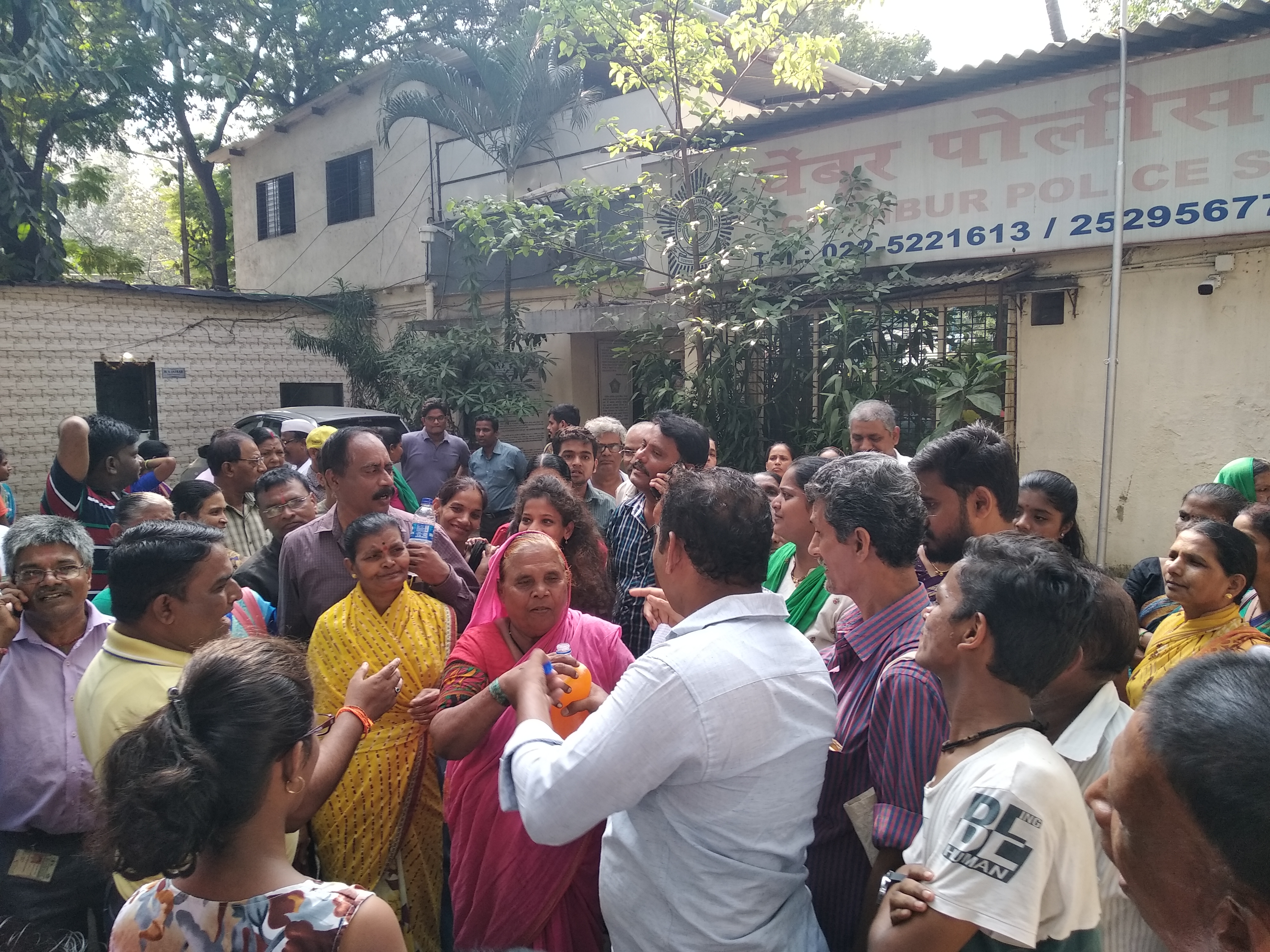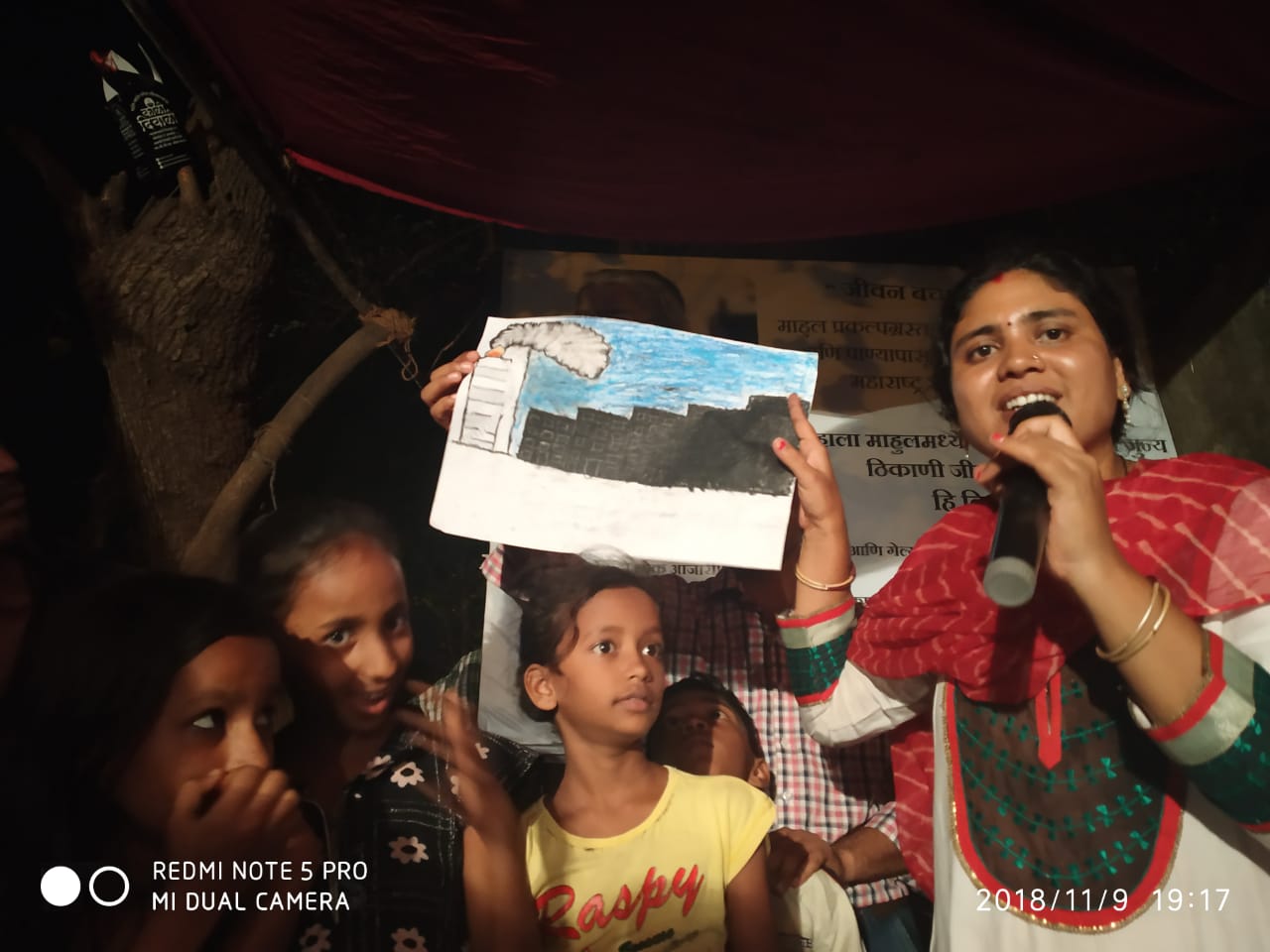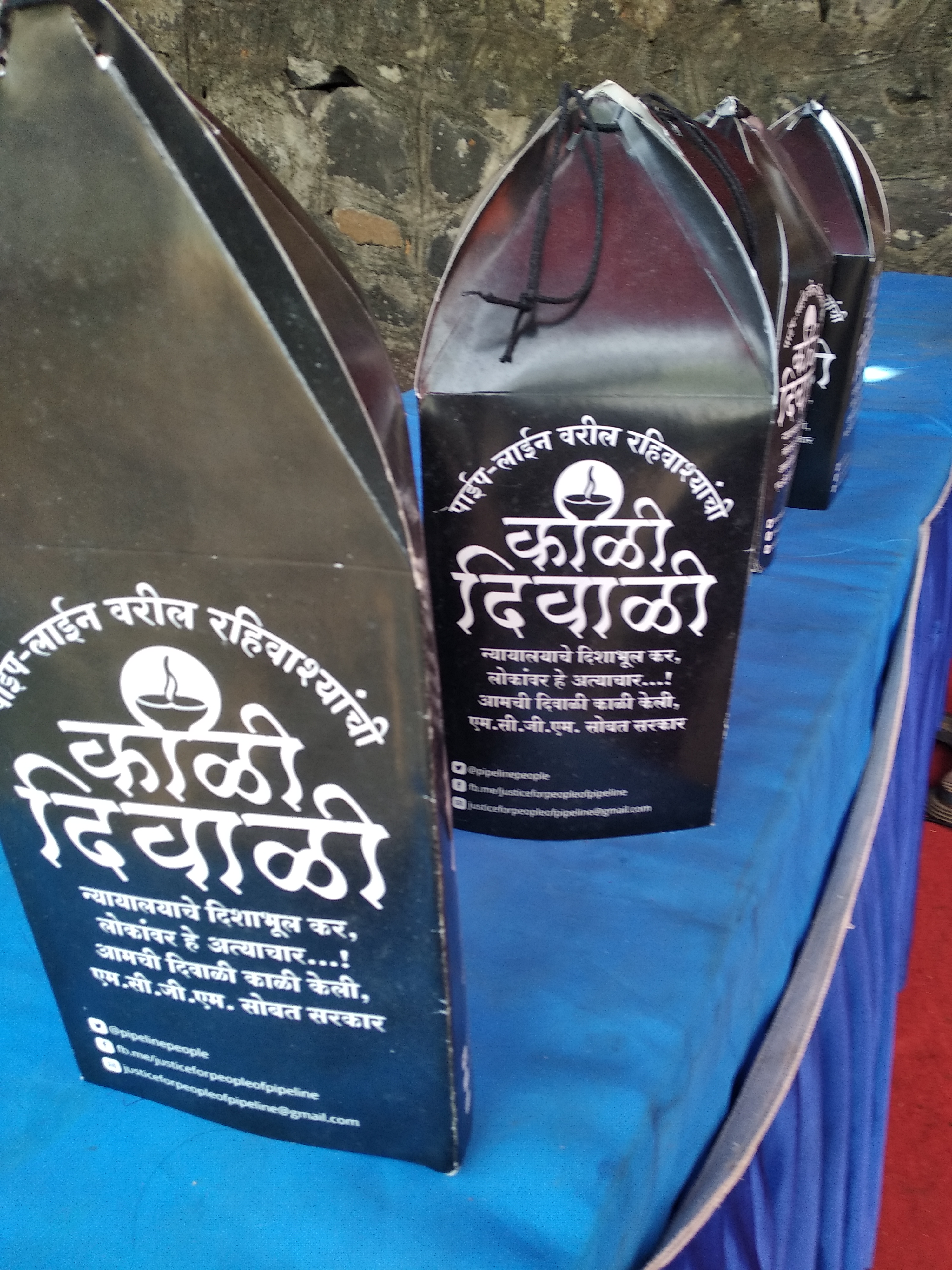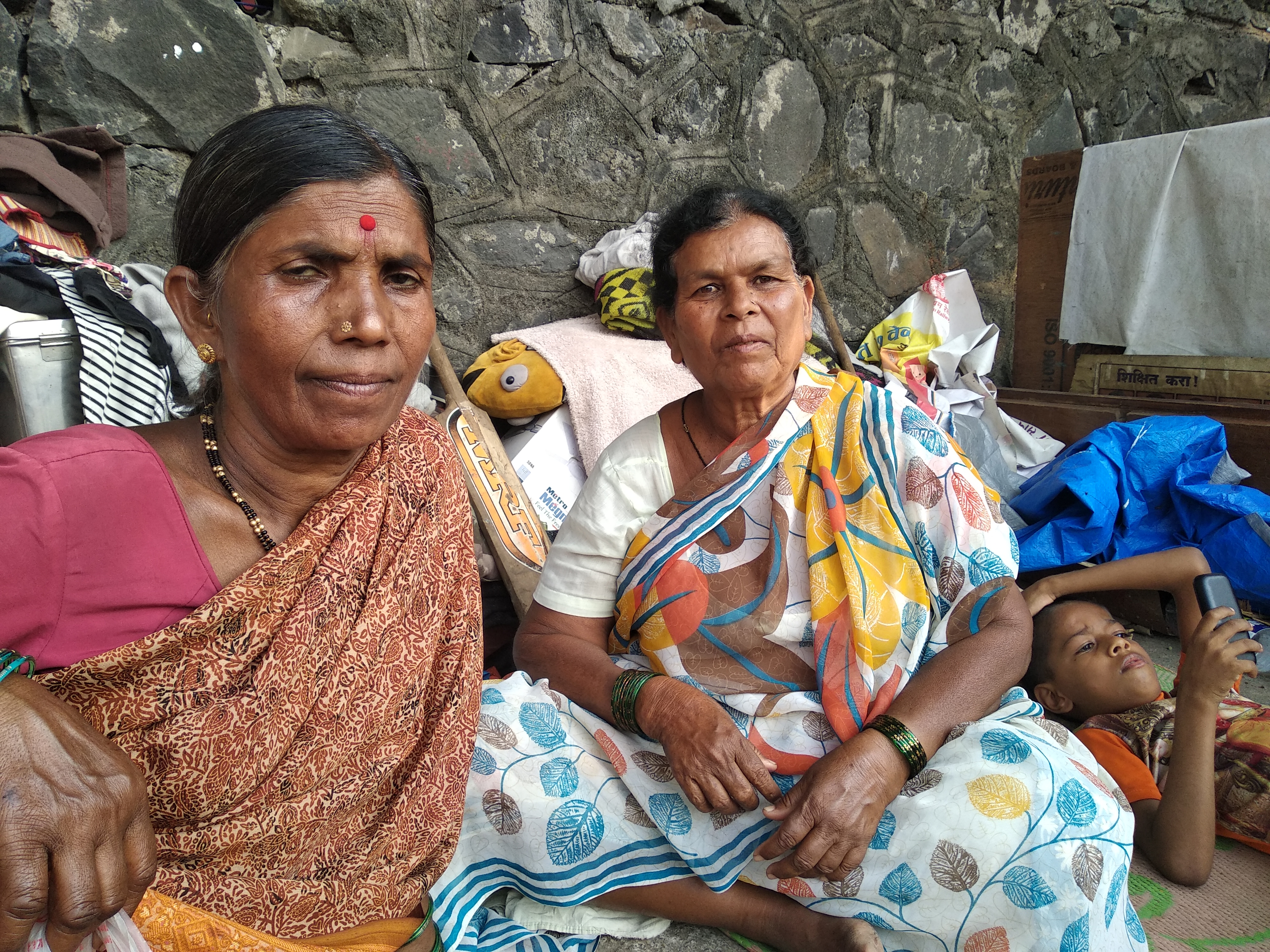The fight of Mumbai’s slums against forceful eviction and deadly “rehabilitation” continues. As the Maharashtra Government and the Bombay Municipal Corporation continue to violate a High Court order mandating proper and just rehabilitation for the slum residents evicted last year from all along the Tansa water pipeline, the protests have now spilled onto the streets. We earlier published a piece on these protests titled “Evicted Mumbai slum residents occupy footpath as protest“, and another “Mahul Residents Continue Protest, Demand Rehabilitation for All, Show Black Placards to CM Fadnavis“. For this post, GroundXero spoke to four women who are amongst those leading the fightback by the residents of Mahul Slum Rehabilitation Apartments.
Anita Dattatreya Dhole
On 13th May 2017, they demolished our homes. I stayed put here with my family, out in the open for 40 days, even in the rains. All the things in my home were thrown out in the open, to get drenched in the rains. We preferred this place over going to Mahul. We knew about Mahul, it is unlivable. We had read reports about the pollution in Mahul. Our MLA Prakash Mehta (BJP) himself, who is now a cabinet minister, had promised us we would not have to go to Mahul. On 28th December 2016, CM Devendra Fadnavis, while distributing keys to 400 of the families at a flashy function here in Vidyavihar, had announced that every single family displaced by the Tansa demolitions will be rehabilitated in the city, and not in Mahul. “I have 1700 keys in my pocket”, he had said. But soon after the Municipal Corporation Elections, the CM backtracked from his spoken words. In February 2017, the Corporation elections got over and Parag Shah (BJP) got elected from our ward with a heavy margin, on the promise of ensuring that we will not be sent to Mahul. But within a few months of his election victory, our homes were demolished, in May 2017. BJP leaders worked as agents in this. We were supposed to be given flats at Kohinoor HDIL inside the city, but we were instead dumped at Mahul, to die in the middle of a toxic hell. Not just us, in fact many BMC workers themselves have been forced to live there in officially allocated quarters. They cannot protest because they are all contract employees. But they are supporting us.
My mother’s blood pressure shot up within 24 hours of her moving to Mahul, along with subsequent breathing troubles. She had to be admitted to ICU, under critical condition. Children are developing skin problems, women are getting their periods twice a month, and many women had miscarriages. Children are being born with physical anomalies and stunted growth. Many newly born babies are chronically sick. We know this is because of the pollution in the area, which has 16 chemical factories and 3 oil refineries. The air is not breathable, the water is not drinkable. The underground BMC water tanks have leakages. You will find 3 to 4 patients in an average household there. TB, asthma, breathlessness are rampant.
A friend and I – two of us were the first people to start organising the struggle for proper rehabilitation for Mahul residents. We would go from house to house to talk to people, and tell them that we can’t sit and die here. I had no prior experience of a political struggle like this. I was frustrated with the dishonesty of political leaders, the MLAs, the MPs, the Chief Minister. I realized that we can’t depend on these leaders. Meanwhile, we got in touch with Medha tai. I had read about her and her work earlier. Medhatai’s involvement in the struggle turned the tide for us. We got to know good lawyers, we filed and won the case at High Court. The word about our struggle reached different corners of the country.
Initially it was not easy to convince people, particularly women in the families. But over time, as they saw their children falling sick one after the other, they started joining the movement. Our numbers rose from 2 to 200 to 2000, to tens of thousands now. And when women get into a struggle with nothing to lose, they never leave. None of these women have left the struggle till date. Many of us have lost our jobs. I used to work in a publishing company, I had to quit my job because the one way travel from Mahul to Mahim, where I worked, would be around 3 hours. My parents are old and sick. Now that I am here at the dharna, there is no one at home to look after them. My mother needs medicines right now, but I don’t know how to get them to her. She is calling me non-stop. She has been in the hospital for the last two days, and I haven’t been able to talk to her properly. She is angry at me. I had to ask my sister-in-law to take care of her since I can’t leave the dharna now. We women are compelled to constantly juggle between being at the struggle, taking care of our sick family members, keeping up with our other jobs, and generally taking care of the community as a whole. This is the condition under which our women and our men are fighting this battle. And still they are not giving up. There are more than 20 women in the leadership of the Mahul struggle today. As this struggle goes on, a thousand more Anitas will emerge.
They say that the pipeline has to be secured from the ‘jhoparpattis’. I was born in this basti and grew up here. Tens of thousands of people have been living here around the Tansa pipeline for decades. There has never been any incident of any harm being caused by the basti residents to the pipeline. In fact, we are the ones who kept it secure all these years. Now that we have been driven out, the pipeline is actually insecure.
Sarobai Salunke
Our jhoparpatti had been here from Ambedkar’s time. We used work as labourers. Our houses used to be thatched. The day they brought Babasaheb’s body to Chaityabhumi, I went with my newly born daughter to see. I have documents from those times, which prove that this was my home. But they still demolished my home. At this age, I was thrown out on to the footpath from my home. Later, they pushed us to Mahul.
Mahul is unlivable. You can’t breathe the air there. You can see faeces flowing down, right next to where you are cooking. We are Babasaheb’s children, and therefore we are still maintaining calm. But when our people decide to come onto the streets, no one will be able to send them back. Yesterday, the BJP officials were fleeing the office, when we gheraoed them [Referring to the gherao of BJP minister Prakash Mehta’s office by Mahul residents on the night of 2nd November. The minister did not eventually show up]. Our women caught them. They should be ashamed of themselves, fleeing from us like this.
That day [October 29, “Evicted Mumbai slum residents occupy footpath as protest”] the police picked some of us up from the dharna site, and took us to the police station. We hadn’t had lunch yet. We picked up our food, and walked all the way to the police station, and put it down in front of the policemen, and asked “You have taken away our homes, now you are not letting us to eat also. We will not move from this police station, unless we are given proper place to stay. You have demolished our home, you have to give us home now.” These people are theives! Chor hain ye! That Gujarati fellow [possibly referring to BJP minister Prakash Mehta] kept lying to us for years, and now he is scared to even face us! That jhopri was in my name. I have been in this struggle from the start, I will stay till all of us get back their homes. Two of my sons have got rooms in Kohinoor SDIL. We know there are still many empty rooms there, but they have kept those rooms for themselves, to sell in the market. Next time if they come to ask for votes again with folded hands, I will throw a garland of chappals at them. We are not scared of them.
This movement is being led by our women, and the men have been fully supporting it. These are women who double up for multiple fights at the same time. I myself spent my entire life working at many places, raised my children, sent them to school. One of my grandchildren is a lawyer now. One is an engineer. Our people, Jai Bhim people, know the value of education. By pushing us into the hell called Mahul, these people have snatched away even education from our children. But we will fight, as Babasaheb taught us.
Pooja
I am from Marol pipeline, in Andheri East. I have been there since 1998, after I got married. Both my kids were born there, and studied there. My elder daughter has written the 12th exams. My son is going to take the exams next year. The issue of the pipeline is an old issue, and our jhoparpatti had always been a point of contention, but none of us imagined that this is how we would be thrown away into Mahul. We were served the first notice for eviction in 2011. It said everyone with proper documents would be properly rehabilitated, and had no mention of Mahul. From 2011 to 2017, we were given false promises by the political leaders. Finally in 2017, they demolished the basti. We already knew that Mahul was unlivable. Mahul is 25-30 kms away from where we were, so this would mean we’d have to quit our jobs, our children their school. A place like Andheri, where we were, had all the basic services available 24 hours, most importantly health and medical facilities. Now in Mahul we have absolutely none of that. The chemicals produced in the chemical factories and refineries at Mahul are extremely toxic, and are known to affect kidneys, lungs, brains, and other body parts.
On 8th August, there was an accident at the BPCL refinery. All the 72 SRA buildings shook from the blast as if it was an earthquake. I was at work that day, when the blast happened. My daughter called me at 3:55 pm, and said that a huge explosion had taken place nearby. It took me one and half hours to reach Mahul. I had to walk parts of the journey, because buses to Mahul are rare. We saw around 25 to 30 ambulances go in and out of the refinery that day. We don’t know the actual number of workers who got injured or died in the blast, because those details are kept confined from the public by the company. And this is not a stray incident. In 2017, Bharat Petroleum’s oil tanks in Butcher Island caught fire, it was massive. Who dumps human beings in such areas? The only explanation is: you think of poor people as animals. Even animals are kept at cleaner and safer places. These people seem constantly worried about the safety of the cow. “Gai humaari maata hai”, they say. But look what they are doing to human beings who are also mothers. Gareeb ki jaan inke liye ekdum sasti hoti hai. That’s why they see no contradiction in building 2 BHK, 3 BHK flats for the rich, and allocating 225 sq ft of area for families like us in hells like Mahul. They want us to die. They have Rs. 3000 crores to spend for a statue (referring to the Patel statue in Gujarat), 3600 crore to build the statue of Shivaji off the coast here, but they don’t have the money to properly rehabilitate us. We are not asking for your BHKs, we are just saying give us back our 10 ft by 10 ft space where we can live like human beings.
We had no intentions to fight and agitate, this battle has been imposed upon us by the Government. Even yesterday, one child in Mahul was detected with TB, and is in hospital now. Many of us are eating only once a day to save money for the treatment of our children and parents. Many families have gone into debt because of lakhs of rupees spent as medical costs. Modi ji talks about “Beti padhao, Beti bachao”. He should be held accountable for the number of daughters of India whose lives have been sacrificed, to beautify a pipeline. He talks about Lord Ram. Does he think this is how Ram would have ruled this country?
It was not easy for women like us to take such an active part in a struggle. I myself was a very different person. Till 3 years after my marriage, I basically remained indoors, I did not have a public life. But there are certain points of time when a woman has to make her own decision, whatever she thinks is right, despite what everyone around tells her. Nowadays when my distant relatives see me, they get shocked because they haven’t seen me like this ever. Luckily I have had a lot of support from my husband for whatever I am doing. The fact that we are seeing so many women in this struggle, means that there is overall support from the men in our community to women taking up such roles. On the other hand, I also know that the women from this struggle will go back into their households with a lot more confidence and courage for sure. Many women told me that regardless of whether we win this battle or not, their lives are changed for good.
Seema (name changed on her request)
Life is an endless, everyday struggle for women like us. Only the nature of struggles keep changing. Sometimes she has to fight with others for her families, other times she has to fight in the family for her own identity, and sometimes she has to fight for her children. Basically she keeps fighting on different fronts in different forms.
I have lost a few things in this struggle. For a year and a half I haven’t been able to pay attention to my family. But what can I do? My family will remain safe if my home is secured. My personal life is also affected. My children complain that I am busy the whole time. “She only talks about the Court,” they say. People would visit me at wee hours to discuss the issue. It was troublesome but the work couldn’t stop. My husband and I also thought about separating as we could barely agree with each other. He didn’t believe that I was in the wrong, but he thought that this powerful administration, this corrupt system will fail the few of us who are fighting it. I was told by people that my political life will destroy the family, etc. Questions were raised about my character because I had to work regularly with other men, many of who are a vital part of the struggle. It went to the extent that my husband told me that I had to choose between the family and the struggle. I asked myself, why does this happen all the time? Both my family and this struggle, are equally dear and important to me. And particularly when the struggle is precisely for the well-being of my family, then how do I pick one over the other? If I leave my family, then who do I even struggle for? I was at a complete loss about what to do.
My mother called me and asked me why I was doing all this and why was damadji (son-in-law) saying all such things. I sent my mother media reports and videos about the issue, about our struggle. I asked her to go through the reports and then discuss such things with me. I told her, “If you talk to me as your daughter this would be the last time you would hear from me. But if you would like to speak to me as a woman being a woman yourself, and guide me as a woman, I will always listen to everything you have to say”, and I disconnected the phone call. When she called me a few days later, I asked her who she was talking to. She said she wanted to speak to a fellow woman, and told me that she stood by me in the struggle and that she was proud of what I was doing. “I don’t know if you will win or lose but you have to continue the struggle. I support you,” she said. Over time I started gaining confidence. When the Court order came in our favour, the people’s faith in the struggle was also redeemed. As the struggle progressed, more people joined us. Today my entire family, my husband, my children are all with me together in the movement. Out of what initially felt like 30,000 dead bodies, at least 20,000 have come alive now. I wish the rest of the 10,000 will also join us subsequently. We went around people’s houses to talk about the issue. We would stop people on the streets and talk. We would discuss these things while traveling in the bus, to work. Many times we have been pushed out by people from their homes because they did not want to listen to what we had to say, many described us as insane and crazy. But these things happen in any struggle.
Even when the men fight, there is a woman somewhere who is playing a supportive role so that the man can go out and fight. And if that female support does not exist, I don’t think the man can continue any of his fights. But the special thing about a woman is that when she decides to go neck-deep in the water, she does not think about anything else. One of the reasons for this is because of her lifelong experience of handling risks and challenges. Women are forced to face challenges from the very moment that they are born. Taking up a challenge is nothing new for her. Today I talk to everyone – be it men, women, children, old or young. But when I was a teenager I was repeatedly told not to talk to boys or men in a certain way. I was instructed about how to behave and lead my life, constantly. I used to accept these challenges, and I would tell myself, “Main galat nahi hoon toh teri rai lene ki zaroorat kya hai?” [“If I don’t think I am doing anything wrong, then what’s the need to take your opinion?”]. I have my own principles and rules, of what is right and what is wrong. In this case, my principle says that the way we have been treated, the way our children have been treated, is wrong! When I teach children Civics, I wonder what to teach. Because the truth is so different from what is written in the books. How can we teach our children about a society we can’t give them? We should either change our society or change our books. We should write the truth in the books. I have stopped teaching the kids since. At least not Civics.
The Mahul Gaon Prakalp Samity leadership, that includes Ghar Bachao Ghar Banao Andolan, has a steering committee, and there are both women and men in that committee. Within this committee, no distinction is made based on the gender of the committee member. “Matlab usme bhed hi nahi hai ki aap mahila ho aap itna hi sochogi, aap itna hi bologi, aap yeh hi karogi. Bilkul nahi.” (“there is no such restriction in the committee that if you are a woman, you will do only this, or speak only this much. Absolutely no.”) Whenever Mahul Gaon Prakalp Samity goes for any meeting with a minister, or MLAs, our committee itself asks the women to do the talking. Women must always come forward to speak on their own behalf. And men must note that there is nothing to feel insulted about, if a woman does the speaking.
When your home is being demolished, when you start receiving eviction notices, you must fight, and it’s a relentless fight. Because when we build a home, it is not just four walls, the home is weaved with our dreams, our aspirations. And when that home is demolished … our whole universe is destroyed, the women of the house lose their minds. When I decided to come here for the dharna, I told my family that this is the action I have decided to take. For now the plan is to camp on the footpath for a few months, but personally if I have to stay there in protest for the rest of my life, I am not going to step back. Aap maante ho toh saath do varna bol do main aapna raasta akela chun lungi.[If you agree, please be there with me. Otherwise you let me know and I will choose my path alone.]
Medha Patkar : Do join in to make it a largest human chainTragedy of the day is that country's poor citizens are made to forget demanding रोटी, कपड़ा, शिक्षा, मकान but are struggling just for their survival. The struggle of Mahul residents symbolises this tragedy. Mahul residents who're demanding safe housing as per Court's order have decided to expose the Government's failure to ensure basic human right to life and also to show their unity and strength by forming a 1km long human chain. To make it even larger, do join in large number and express your support and solidarity to the struggle of residents of Mahul. Residents of Tansa pipeline area whose homes were demolished last year and who were given houses in the critically polluted area like Mahul in the name of rehabilitation have been protesting since last 14 days for their right to a dignified life.The citizens have not lost their determination till now and have been sitting on a footpath since 28th October to protest to get fair rehabilitation. All 5,500 families currently living in Mahul should be rehabilitated to a safer place as soon as possible in order to save their lives. Time: 4pm to 5pm | Date: 11th Nov. 2018Starting point: From Sindhuwadi signal, near Tabela, Ghatkoper east to Cama lane, Ghatkoper West.We appeal to all citizens of Mumbai including students, teachers and people who are part of progressive and democratic organisations to please join the chain and make it longer to extend support to the citizens dwelling in Mahul.लढेंगे जितेंगे !!माहुलवासियांचा यल्गारमागील तेरा दिवसांपासून 'जीवन बचाओ आंदोलन' सुरूच जगण्याच्या मानवी साखळी सध्याच्या काळात दुर्दैवाची गोष्ट म्हणजे सरकारचे देशाच्या गरीब नागरिकांना विसरून जाणे. या गरिबांना रोटी, कपडे, शिक्षण, घर एवढेच नव्हे तर त्यांचे अस्तित्व टिकवण्यासाठी सुद्धा सतत लढत राहावे लागते. माहुल रहिवाशांचा संघर्ष याचेच प्रतीक आहे. माहुलच्या रहिवाशांनी न्यायालयीन आदेशानुसार सुरक्षित निवास मिळविण्याची मागणी केली आहे. मात्र सरकार ही साधी मागणी मान्य करण्यास टाळाटाळ करत आहे. तेव्हा मूलभूत मानवी हक्क सुनिश्चित करण्यासाठी सरकारची विफलता दर्शविण्याची आणि व त्याविरोधात लढण्याऱ्या नागरिकांचे ऐक्य आणि शक्ती दर्शविण्यासाठी 1 किलोमीटरची मानवी शृंखला तयार करण्याचा माहुल रहिवाश्यांनी निर्णय घेतला आहे. ही मानवी साखळी आणखी मोठी करून माहुल रहिवाश्यांना त्यांच्या संघर्षात पाठिंबा देण्यासाठी मोठ्या संख्येने सहभागी व्हा.
Posted by Mumbais Toxic Hell माहूल on Sunday, 11 November 2018
(All photos: GroundXero)

